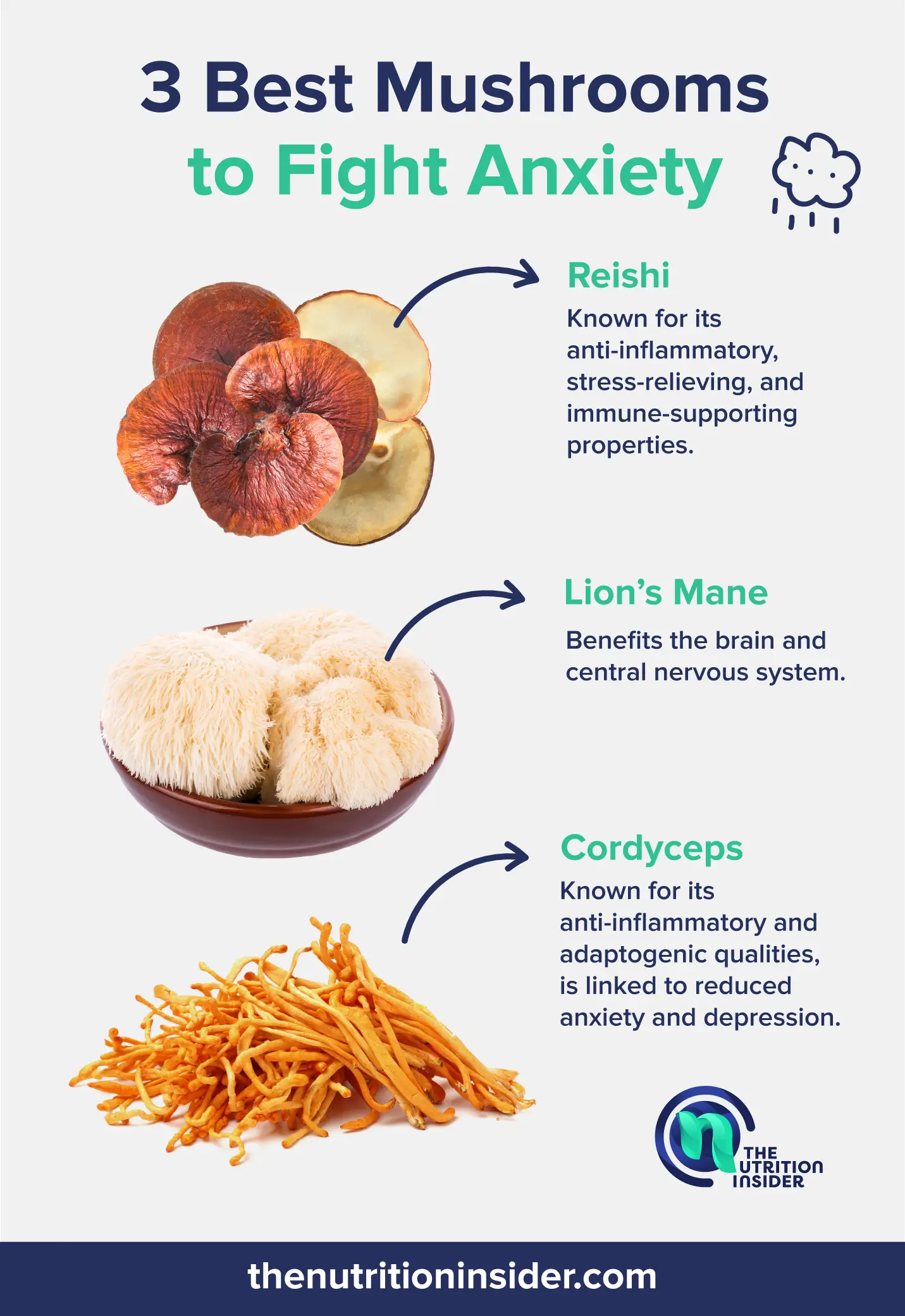Talk to a Registered Dietitian and use INSIDER20 for 20% off!
Talk to a real Dietitian for only $99: Schedule Now
Evidence Based Research To fulfill our commitment to bringing our audience accurate and insightful content, our expert writers and medical reviewers rely on carefully curated research.
Read Our Editorial Policy
Mushrooms have been long appreciated for their culinary value—but in recent years, medicinal mushrooms have exploded in popularity in the health and wellness world.
Medicinal mushrooms are a unique type of fungi that are more powerful than the standard white button mushrooms you see at a salad bar or topping a veggie pizza, but not quite as potent as those other types of mushrooms (no hallucinating here).
Most commonly consumed in their extracted form in a powder or capsule, medicinal mushrooms are becoming an increasingly popular way to support health—including reducing anxiety or stress.
Although there are many types of medicinal mushrooms—sometimes referred to as functional mushrooms—the three that are most associated with reduced anxiety are reishi, lion’s mane, and cordyceps.
Nutrient tweaks shown to support ADHD brains—no guesswork.
Nutrient tweaks shown to support ADHD brains—no guesswork.

Medicinal mushrooms provide additional therapeutic benefits above and beyond their nutritional qualities and have been used in Eastern healing practices for millennia.
Some functional mushrooms also function as adaptogens, meaning they help the body adapt to stressors.
Medicinal mushrooms support immune and digestive health due to a compound called beta-glucan, a polysaccharide carbohydrate in the shrooms’ cell walls.
Beta-glucan is a soluble fiber and prebiotic, providing food for healthy gut bacteria to flourish.
The microbiome is also closely linked to mental health through the gut-brain axis—people with more robust gut health are less likely to develop anxiety, depression, and other mental health disorders.
Another family of compounds that provides medicinal mushrooms with their benefits is the terpenoids, which have been shown to protect against neurodegenerative diseases and cancer.
In addition, medicinal mushrooms have been found to:
Mushroom supplements typically are made up of extracted and then dried functional mushrooms.
They can be consumed in capsule, tincture, or powdered form.
The most potent mushroom supplements will use a double extraction process, which utilizes both water and alcohol-based extractions to pull out the full benefits of the mushrooms into the supplement.
As medicinal mushroom powders tend to be bitter, they can be mixed with other ingredients to create a tasty tea or coffee or simply packaged into capsules to avoid the bitter taste.

With their high content of beta-glucan fiber and terpenoid compounds, medicinal mushrooms are thought to provide cognitive and mental health benefits.
Many people wonder how many mushrooms they need to take for anxiety.
The mushroom dose will vary by person and mushroom—as mushroom pills for anxiety tend to come in supplemental form, stick to the recommended dosage you see on the bottle.
Reishi (Ganoderma lucidum) is sometimes referred to as the “mushroom of immortality,” as it exhibits potent anti-inflammatory, stress-relieving, and immune-supporting properties.
In addition to containing beta-glucan polysaccharides, reishi is the only known dietary source of ganoderic acid, a triterpene compound with strong inflammation-fighting potential.
Reishi also contains 5-hydroxy-L-tryptophan (5-HTP), a direct precursor to serotonin—a neurotransmitter that is sometimes dysregulated in people with mood disorders.
Reishi’s adaptogenic qualities also provide its ability to improve sleep quality, reduce stress, and improve mood.
In a clinical trial of women with fibromyalgia, those who took reishi mushrooms daily for six weeks had trends of improved happiness and life satisfaction with reductions in depression compared to baseline levels.
Another study with reishi found that cancer patients taking the mushroom had significantly better markers of subjective well-being with reduced anxiety, stress, and fatigue.
With its name originating from the mushroom’s likeness to the long hair of a lion, the lion’s mane mushroom (Hericium erinaceus) is known to benefit the brain and central nervous system.
Lion’s mane contains bioactive compounds called erinacines that support nerve growth factors like BDNF (brain-derived neurotrophic factor), which increases neurogenesis—the growth of new neurons in the adult brain.
Low BDNF levels are linked to depression and anxiety, so this is one possible way that lion’s mane supports mood regulation.
Lion’s mane also reduces the activity of pro-inflammatory signaling molecules called cytokines and scavenges for free radicals that cause oxidative damage to cells.
This neuroprotective role lends itself to reducing anxiety, as lion’s mane aids in coping with stress and prevents a decrease in serotonin and dopamine.
In research with stressed mice, supplementation with lion’s mane exerted anxiety-reducing and antidepressant-like effects, which were mediated by enhancing neurogenesis in the brain’s hippocampus.
Cordyceps is a parasitic fungi genus containing over 700 species, although Cordyceps sinensis and Cordyceps militaris are the two most commonly studied.
Traditionally, the cordyceps mushroom has been used to stimulate energy, stamina, and endurance—which you might think would be unhelpful for anxiety.
However, cordyceps’ anti-inflammatory and adaptogenic qualities have associated this mushroom with reduced anxiety and depression.
Research suggests that cordyceps exhibit anti-depressive activity by acting on certain receptor sites in the central nervous system, which are thought to play a role in modulating neurotransmitter activity and mood.
Although many studies have reported the anti-stress abilities of cordyceps in animals, we don’t have research with humans yet.
However, a triple-blind randomized controlled clinical trial is currently underway in Taiwan, looking at the impact of cordyceps supplementation on mood and cortisol levels in adults.
While regular mushrooms are undoubtedly healthy, they don’t have as many bioactive compounds as medicinal mushrooms like reishi, lion’s mane, and cordyceps.
However, regular mushrooms—especially shitake, morel, chanterelle, portobello, and oyster—have many redeeming nutritional qualities, including being low in calories and carbohydrates with high levels of vitamins, minerals, and antioxidants.
As eating a healthy diet with plentiful micronutrients is helpful for mood regulation, these “regular” mushrooms could definitely play a role in reducing anxiety and managing mood.
Yes, research suggests that cordyceps are a good mushroom supplement for anxiety.
Cordyceps can benefit anxiety by providing adaptogenic qualities that act on the central nervous system to reduce stress.
Chaga is another type of medicinal mushroom, although its benefits are less linked to reduced anxiety.
The benefits of chaga primarily target the immune system, as chaga reduces inflammation and provides antioxidant support.
Chaga is exceptionally high in a compound called superoxide dismutase (SOD)—an enzyme that fights oxidative damage from the compound superoxide, the most abundant free radical in the body.
There are three functional mushrooms that research suggests are best for depression:
– Lion’s mane
– Reishi
– Cordyceps
Yes, medicinal mushrooms are good for stress, as they help the body adapt to stressors and provide antioxidant and anti-inflammatory activity that can mitigate the negative impacts of stress.
Regular mushrooms that you’d find at the grocery store can also be beneficial for stress, as they are highly nutritious and support gut health, which is closely linked to mood.
Chong PS, Fung ML, Wong KH, Lim LW. Therapeutic Potential of Hericium Erinaceus for Depressive Disorder. Int J Mol Sci. 2019;21(1):163. Published 2019 Dec 25. doi:10.3390/ijms21010163
Clapp M, Aurora N, Herrera L, Bhatia M, Wilen E, Wakefield S. Gut microbiota’s effect on mental health: The gut-brain axis. Clin Pract. 2017;7(4):987. Published 2017 Sep 15. doi:10.4081/cp.2017.987
Janke KL, Cominski TP, Kuzhikandathil EV, Servatius RJ, Pang KC. Investigating the Role of Hippocampal BDNF in Anxiety Vulnerability Using Classical Eyeblink Conditioning. Front Psychiatry. 2015;6:106. Published 2015 Jul 24. doi:10.3389/fpsyt.2015.00106
Pazzi F, Adsuar JC, Domínguez-Muñoz FJ, García-Gordillo MA, Gusi N, Collado-Mateo D. Ganoderma lucidum Effects on Mood and Health-Related Quality of Life in Women with Fibromyalgia. Healthcare (Basel). 2020;8(4):520. Published 2020 Nov 30. doi:10.3390/healthcare8040520
Ryu S, Kim HG, Kim JY, Kim SY, Cho KO. Hericium erinaceus Extract Reduces Anxiety and Depressive Behaviors by Promoting Hippocampal Neurogenesis in the Adult Mouse Brain. J Med Food. 2018;21(2):174-180. doi:10.1089/jmf.2017.4006
Venturella G, Ferraro V, Cirlincione F, Gargano ML. Medicinal Mushrooms: Bioactive Compounds, Use, and Clinical Trials. Int J Mol Sci. 2021;22(2):634. Published 2021 Jan 10. doi:10.3390/ijms22020634
Zhao H, Zhang Q, Zhao L, Huang X, Wang J, Kang X. Spore Powder of Ganoderma lucidum Improves Cancer-Related Fatigue in Breast Cancer Patients Undergoing Endocrine Therapy: A Pilot Clinical Trial. Evid Based Complement Alternat Med. 2012;2012:809614. doi:10.1155/2012/809614